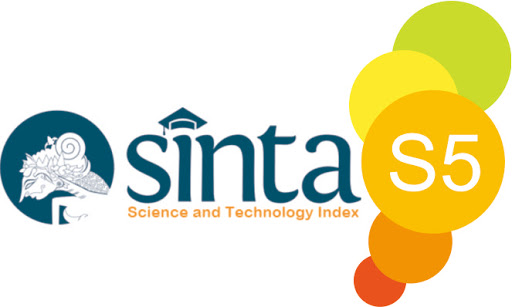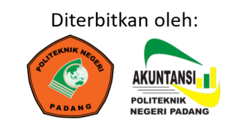|
…::Menu Utama::... |
Etika Publikasi
Akuntansi dan Manajemen merupakan jurnal blind-review yang diterbitkan secara periodik dua kali dalam satu tahun (Juni dan Desember). Akuntansi dan Manajemen memublikasikan tulisan-tulisan dalam bidang akuntansi dan keuangan yang memiliki kontribusi signifikan terhadap perkembangan ilmu pengetahuan, pemikiran, profesi dan praktik akuntansi di Indonesia khususnya dan dunia pada umumnya.
Publikasi artikel dalam jurnal blind-review adalah merupakan bagian penting dalam pengembangan ilmu pengetahuan. Publikasi merupakan suatu pencerminan langsung atas kualitas hasil karya penulis dan institusi yang menaunginya. Artikel dari hasil blind-review mendukung dan mewujudkan pendekatan ilmiah. Oleh karena itu, diperlukan suatu standar perilaku etika bagi semua pihak yang terlibat dalam publikasi: editor jurnal, reviewer, dan penulis.
Panduan ini diadopsi berdasarkan kebijakan etika publikasi dari Elsevier.
STANDAR ETIKA BAGI EDITOR
1. Keputusan Publikasi
Editor Akuntansi dan Manajemen bertanggung jawab memutuskan artikel yang akan dipublikasikan dari artikel yang diterima. Keputusan ini didasarkan pada validasi atas artikel serta kontribusi artikel tersebut bagi peneliti dan pembaca. Dalam menjalankan tugasnya, Editor dipandu oleh kebijakan dari dewan editor dan tunduk pada ketentuan hukum yang perlu ditegakkan seperti pencemaran nama baik, pelanggaran hak cipta, dan plagiarisme. Editor dapat berdiskusi dengan editor atau reviewer lainnya dalam pengambilan keputusan tersebut.
2. Penilaian yang Obyektif
Editor melakukan evaluasi atas suatu naskah berdasarkan konten intelektualitasnya tanpa adanya diskriminasi dalam agama, etnis, suku, jenis kelamin, bangsa, dan lain-lain.
3. Kerahasiaan
Editor dan staf editorial tidak boleh mengungkapkan segala informasi tentang naskah yang telah diterima kepada siapapun, selain penulis, reviewer, calon reviewer, dan dewan editor.
4. Konflik Kepentingan
Materi artikel yang dikirim ke Akuntansi dan Manajemen dan belum dipublikasikan tidak boleh digunakan untuk riset pribadi editor tanpa mencantumkan izin tertulis dari penulis. Informasi atau ide yang diperoleh melalui blind review harus dijaga kerahasiaanya dan tidak digunakan untuk kepentingan pribadi. Editor harus menolak untuk meninjau naskah jika editor memiliki benturan kepentingan, yang disebabkan karena adanya hubungan kompetitif, kolaboratif, atau hubungan lainnya dengan penulis, perusahaan, atau institusi yang berhubungan dengan naskah tersebut.
5. Kerjasama dalam Investigasi
Editor harus mengambil langkah responsif apabila terdapat keluhan terkait etika pada naskah yang telah diterima ataupun pada artikel yang telah dipublikasikan. Editor dapat menghubungi penulis naskah serta memberikan pertimbangan atas keluhan tersebut. Editor dapat juga melakukan komunikasi lebih lanjut kepada institusi atau lembaga riset terkait. Ketika keluhan telah teratasi, hal-hal seperti publikasi atas koreksi, penarikan, pernyataan keprihatinan, ataupun catatan lainnya, perlu dipertimbangkan untuk dilakukan.
STANDAR ETIKA BAGI REVIEWER
1. Kontribusi terhadap Keputusan Editor
Blind peer review oleh reviewer membantu editor dalam mengambil keputusan serta dapat membantu penulis dalam memperbaiki tulisannya melalui komunikasi editorial antara reviewer dengan penulis. Peer review merupakan suatu komponen penting dalam komunikasi keilmuan formal (formal scholarly communication) dan pendekatan ilmiah.
2. Ketepatan Waktu
Apabila reviewer yang ditugaskan merasa tidak memiliki kualifikasi untuk melakukan review atas suatu naskah atau mengetahui bahwa tidak mungkin untuk melakukan review dengan tepat waktu, reviewer yang ditugaskan harus segera memberitahukannya pada editor.
3. Kerahasiaan
Setiap naskah yang telah diterima untuk direview harus diperlakukan sebagai dokumen rahasia. Naskah tesebut tidak boleh diperlihatkan kepada atau didiskusikan dengan orang lain kecuali jika telah diotorisasi oleh editor.
4. Obyektif
Review harus dilakukan secara objektif. Kritik yang bersifat pribadi atas penulis adalah tidak tepat. Reviewer harus menyampaikan pandangannya secara jelas disertai dengan argumen yang mendukung.
5. Kelengkapan dan Keaslian Referensi
Reviewer harus mengidentifikasi karya publikasi yang belum dikutip oleh penulis. Suatu pernyataan tentang observasi atau argumen yang telah dipublikasikan sebelumnya harus disertai dengan kutipan yang relevan. Reviewer harus memberitahukan kepada editor atas kesamaan yang substansial atau overlap antara naskah yang sedang di-review dengan tulisan lainnya yang telah dipublikasikan, sesuai dengan pengetahuan reviewer.
6. Konflik Kepentingan
Materi artikel yang belum dipublikasikan tidak boleh digunakan dalam riset pribadi reviewer tanpa mencantumkan izin tertulis dari penulis. Informasi atau ide yang diperoleh melalui peer review harus dijaga kerahasiaanya dan tidak digunakan untuk kepentingan pribadi. Reviewer harus menolak mereview naskah jika reviewer memiliki benturan kepentingan, yang disebabkan karena adanya hubungan kompetitif, kolaboratif, atau hubungan lainnya dengan penulis, perusahaan, atau institusi yang berhubungan dengan karya tersebut.
STANDAR ETIKA BAGI PENULIS
1. Standar Penulisan
Penulis harus menyajikan makalah/artikel yang akurat atas penelitian yang dilakukan serta menyajikan diskusi yang obyektif atas signifikansi penelitian tersebut. Data penelitian harus disajikan secara akurat dalam artikel. Suatu artikel harus cukup terinci dengan referensi yang memadai untuk memungkinkan orang lain melakukan replikasi atas karya tersebut. Penipuan atau penyajian makalah yang tidak akurat merupakan perilaku tidak etis dan tidak dapat diterima.
2. Akses Data Penelitian
Penulis dapat diminta untuk menyediakan data mentah atas tulisan yang akan direview dan harus dapat menyediakan akses publik atas data tersebut jika memungkinkan, serta harus dapat menyimpan data tersebut dalam jangka waktu yang wajar setelah publikasi.
3. Orisinalitas dan Plagiarisme
Plagiarisme dalam semua bentuk merupakan perilaku tidak etis dalam publikasi karya ilmiah dan tidak dapat diterima. Penulis harus memastikan bahwa seluruh hasil kerja yang disajikan merupakan karya orisinil, dan jika penulis telah menggunakan pekerjaan dan/atau perkataan dari orang lain, maka penulis harus menyajikan kutipan secara tepat. Terdapat berbagai macam bentuk plagiarisme, seperti mengakui tulisan orang lain menjadi tulisan milik sendiri, menyalin atau menulis kembali bagian substansial dari karya orang lain tanpa menyebut sumbernya, serta mengklaim hasil penelitian yang dilakukan oleh orang lain. Self-Plagiarism atau oto plagiarisme adalah salah satu bentuk plagiarisme. Oto plagiarisme adalah mengutip hasil atau kalimat dari karya sendiri yang sudah dipublikasikan tanpa menyebutkan sumbernya.








